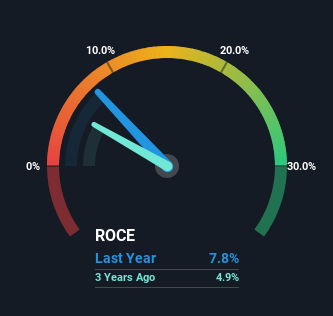- Saudi Arabia
- /
- Healthcare Services
- /
- SASE:4009
Middle East Healthcare (TADAWUL:4009) Will Want To Turn Around Its Return Trends

To find a multi-bagger stock, what are the underlying trends we should look for in a business? In a perfect world, we'd like to see a company investing more capital into its business and ideally the returns earned from that capital are also increasing. Put simply, these types of businesses are compounding machines, meaning they are continually reinvesting their earnings at ever-higher rates of return. In light of that, when we looked at Middle East Healthcare (TADAWUL:4009) and its ROCE trend, we weren't exactly thrilled.
What Is Return On Capital Employed (ROCE)?
Just to clarify if you're unsure, ROCE is a metric for evaluating how much pre-tax income (in percentage terms) a company earns on the capital invested in its business. Analysts use this formula to calculate it for Middle East Healthcare:
Return on Capital Employed = Earnings Before Interest and Tax (EBIT) ÷ (Total Assets - Current Liabilities)
0.078 = ر.س229m ÷ (ر.س4.8b - ر.س1.9b) (Based on the trailing twelve months to June 2023).
So, Middle East Healthcare has an ROCE of 7.8%. In absolute terms, that's a low return and it also under-performs the Healthcare industry average of 15%.
Check out our latest analysis for Middle East Healthcare

Above you can see how the current ROCE for Middle East Healthcare compares to its prior returns on capital, but there's only so much you can tell from the past. If you'd like to see what analysts are forecasting going forward, you should check out our free report for Middle East Healthcare.
So How Is Middle East Healthcare's ROCE Trending?
When we looked at the ROCE trend at Middle East Healthcare, we didn't gain much confidence. Over the last five years, returns on capital have decreased to 7.8% from 13% five years ago. However, given capital employed and revenue have both increased it appears that the business is currently pursuing growth, at the consequence of short term returns. And if the increased capital generates additional returns, the business, and thus shareholders, will benefit in the long run.
The Key Takeaway
In summary, despite lower returns in the short term, we're encouraged to see that Middle East Healthcare is reinvesting for growth and has higher sales as a result. And the stock has followed suit returning a meaningful 44% to shareholders over the last five years. So should these growth trends continue, we'd be optimistic on the stock going forward.
If you'd like to know about the risks facing Middle East Healthcare, we've discovered 1 warning sign that you should be aware of.
While Middle East Healthcare isn't earning the highest return, check out this free list of companies that are earning high returns on equity with solid balance sheets.
New: Manage All Your Stock Portfolios in One Place
We've created the ultimate portfolio companion for stock investors, and it's free.
• Connect an unlimited number of Portfolios and see your total in one currency
• Be alerted to new Warning Signs or Risks via email or mobile
• Track the Fair Value of your stocks
Have feedback on this article? Concerned about the content? Get in touch with us directly. Alternatively, email editorial-team (at) simplywallst.com.
This article by Simply Wall St is general in nature. We provide commentary based on historical data and analyst forecasts only using an unbiased methodology and our articles are not intended to be financial advice. It does not constitute a recommendation to buy or sell any stock, and does not take account of your objectives, or your financial situation. We aim to bring you long-term focused analysis driven by fundamental data. Note that our analysis may not factor in the latest price-sensitive company announcements or qualitative material. Simply Wall St has no position in any stocks mentioned.
About SASE:4009
Middle East Healthcare
A healthcare provider, owns and operates a network of hospitals under the Saudi German Hospital name in the Middle East and North Africa.
Undervalued with proven track record.
Market Insights
Community Narratives



